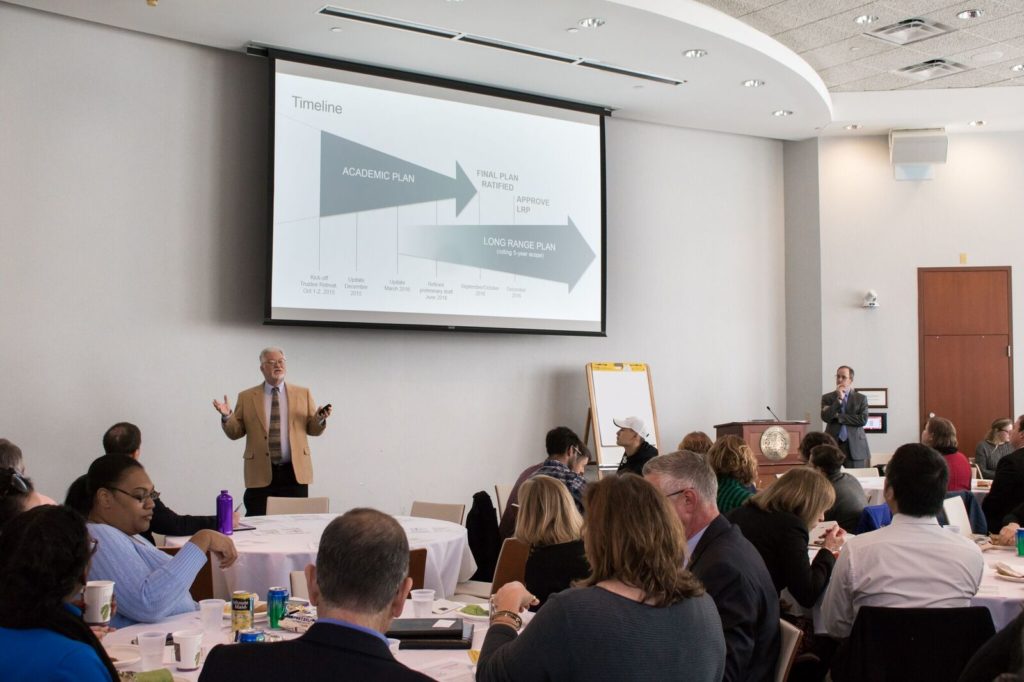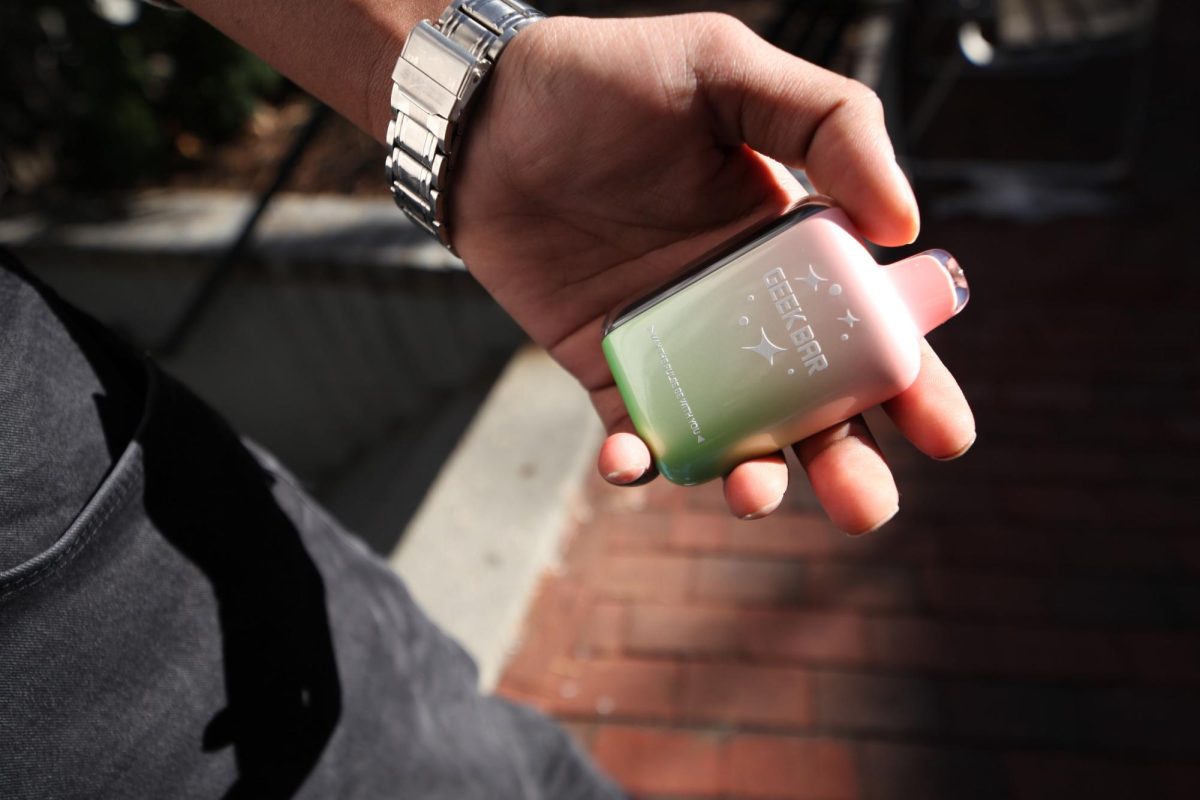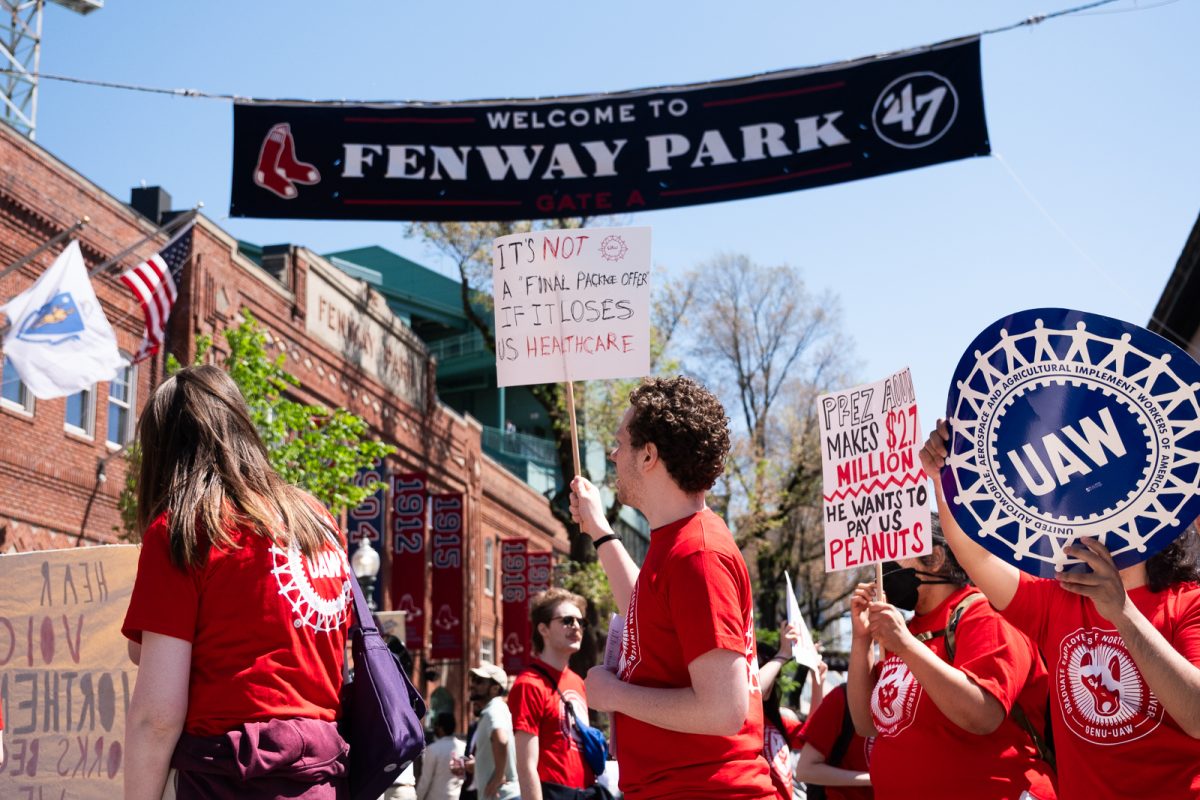By Glenn Billman, news correspondent
In an effort to engage more with the university community, Northeastern Provost James C. Bean and Treasurer Thomas E. Nedell led a town hall meeting Wednesday in the Raytheon Amphitheater.
Bean and Nedell shared the goals of the new academic plan, Northeastern 2025, with a crowd of about 100 people, almost all of whom were staff or faculty members, in the first of a series of eight meetings. Among the proposals were building a new facility for the D’Amore-McKim School of Business, improving the accessibility of international experiences for students and adding a greater variety of laboratories to the Interdisciplinary Science and Engineering Complex, the building under construction on Columbus Avenue set to open January 2017.
Bean verbally invited students who wanted to engage with Northeastern’s academic plan to the town hall meeting during the State of the University address on Oct. 20. However, while faculty were invited to register to attend via email, students said they struggled to find any information about the meeting.
“There was nothing online, nothing in the MyNEU tickets thing, there was no link to anything,” said Riale Gilligan, a sophomore chemical engineering and physics major. “They said that the community would get to comment on this, and the academic plan affects the students the most. We should get to have a say.”
Northeastern spokesperson Matthew McDonald said in an email to The News that the invitation for the town hall was able to reach many students through the live-streamed State of the University address.
“The president did announce the town hall meeting at the State of the University, which, in addition to those in attendance, reached more than 7,000 people through a live Facebook broadcast,” McDonald said. “Dates for the town hall meetings also were included in [News at Northeastern] coverage of the State of the University.”
The time and location of the town hall meetings, however, were not included in the News at Northeastern article.
“It is important that students add their voices to the long-range plan and, in fact, a number of students did attend the Oct. 26 meeting to engage in that process,” McDonald said.
Gilligan and 16 other students and staff members who had not registered ahead of time for the event were placed on a waitlist once they arrived at Raytheon. Ultimately, everyone was let in.
Following Bean and Nedell’s presentation, the attendees were broken off into small groups to brainstorm one thing each they would like to see improved or implemented. Nedell told the students that the first town hall meeting was intended to focus on small group discussions for faculty and staff to share their ideas. He promised that more engagement opportunities have been planned, and he pledged to communicate more clearly with students in the future.
“I love the dialogue, great thoughts,” Nedell said. “It wasn’t intentionally exclusionary.”
Suggestions in the small group discussions ranged from a new arts building and student centers with larger meeting rooms to more culture-based educational opportunities for students going abroad and an improved network to connect students, faculty and alumni.
With escalating tensions between Northeastern and the Roxbury community over the university’s construction of a 22-story dormitory on Burke Street, multiple groups mentioned the need to reevaluate if the university is properly addressing diversity and community engagement. Bean assured the group that solutions are being sought.
“Those are things we are thinking about—where we are not where we need to be,” Bean said. “But we are working on them.”
Chu Huang, the community program manager at Northeastern Crossing, was pleased that the staff, faculty and students kept revisiting the idea of responsibility and the university’s impact on the surrounding neighborhoods.
“Asides from just focusing on concrete, tangible growth, I also would like to see more of how can these revenues be invested in an individual’s growth, one person’s impact,” Huang said. “That doesn’t always look like buildings, right? But more on a human level, what kind of impact can we have?”
At the close of the meeting, all proposals were collected for further review and consideration.
Oliver Fishstein, a junior combined computer engineering and computer science major, was initially frustrated with the lack of student outreach for the meeting but said he was glad that Nedell took time to speak with the students about their concerns. Still, he said he felt that administration was out of touch with what students want.
“I don’t know necessarily if our concerns were really heard,” Fishstein said. “I wish we had the opportunity to say more than one thing, because it’s hard to choose when you have a lot of things that have not been mentioned, especially when you’re the only student perspective in the room.”
In the future, Fishstein said he hopes that the relationship between the administration and the student body improves and that more perspectives are taken into consideration.
“I still think there’s gonna be a lot more pressure that needs to be put on the administration before [its relationship with students] does change, because right now it gets away with not meeting with the community, not really listening to the concerns,” Fishstein said. “The fact that in today’s session a lot of the talk was about building new buildings […] and there wasn’t any representatives from the [Roxbury] community really shows a retreat from the community, because that’s something that will directly impact them.”
A second town hall meeting will be held Nov. 17 at 12 p.m in the Alumni Center on Columbus Avenue.
Photo by Paige Howell















